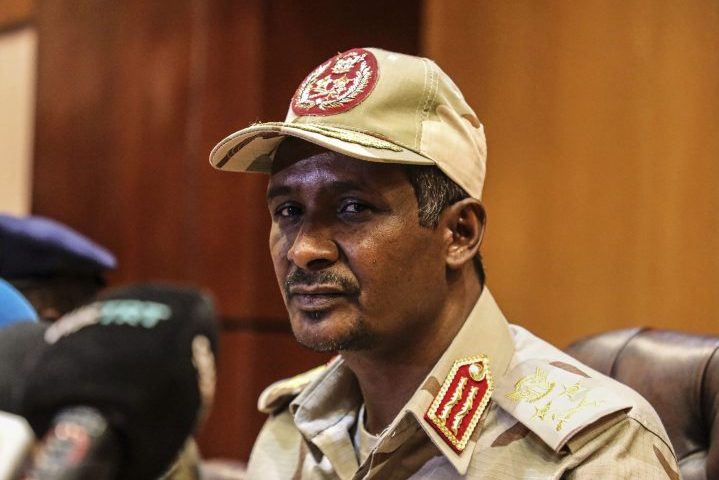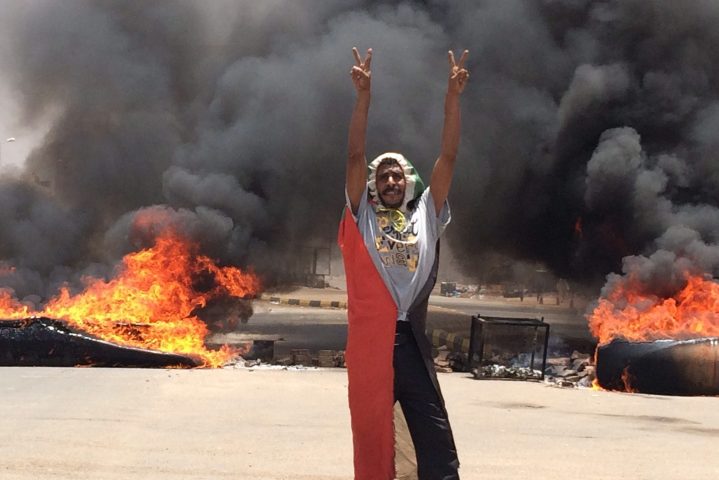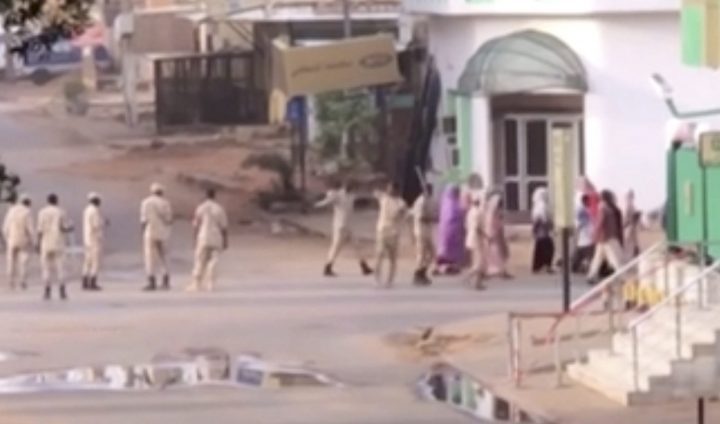Sudan security forces have killed dozens of protesters and the country is teetering on the brink of chaos as military and civilian leaders struggle to decide who will lead the country in the wake of a recent coup.

The chaos dates back to December, when protests broke out across Sudan over cash shortages and the high price of bread. The protests dragged on until April, when the Sudanese military stepped in to remove President Omar al-Bashir from office.
WATCH: Military ousts Sudanese President Omar al-Bashir from power

A military transitional council and the civilian opposition have been trying to hammer out the future of the North African country of 40 million ever since. However, they remain deeply divided over which side will form a three-year transitional government until elections are held.
International critics have condemned the military council and accused some of its members of being complicit in genocide and war crimes in Darfur, a Sudanese region racked by sectarian violence. However, the military council maintains a firm hold on power with support from the Rapid Support Forces (RSF), a brutal paramilitary group composed of veterans from the 2003-07 civil war in Darfur. Many of its members fought to crush al-Bashir’s opponents in that earlier conflict.
WATCH: Protesters demand civilian rule in Sudan

The two sides have been negotiating since April amid a fresh round of protests from civilians unwilling to bend to military rule. However, talks appear to have broken down between the military and the opposition.
The situation came to a head on Monday when protesters staged a sit-in outside the military headquarters in central Khartoum. The RSF eventually emerged from the building and attacked the protesters, according to security footage.
WATCH: Protesters flee after security forces break up sit-in in Sudan

At least 49 protesters and three security personnel were killed in the clash, according to Sudan’s health ministry. The government says nine others have been killed in related violence across the country since Monday.

Get breaking National news
However, opposition leaders and protesters say the death toll is much higher, with at least 108 people now dead at the hands of the RSF. The exact death toll has not been independently confirmed.
The RSF is not officially part of Sudan’s military, but its commander, Gen. Mohamed Hamdan Dagalo, is deputy leader of Sudan’s military council.
The military council says the RSF in Monday’s deadly raid were targeting criminals in an area near the protester camp. The council has also forcefully denied any involvement in illegal actions and says it’s being targeted with a negative media campaign “from hostile parties.”
WATCH: Displaced residents of South Sudan return home as security improves

Dagalo says the military is investigating the violence and will punish anyone found guilty of abuses.
“Any person who crossed boundaries has to be punished,” he said in a televised speech after Monday’s killings.

Dagalo fought in Darfur and has a fearsome reputation in Sudan, where he’s known by the nickname “Hemeti.” He also has allies in Saudi Arabia and the United Arab Emirates and has pledged troops to help those countries in Yemen’s civil war.
Amnesty International is calling for the international community to step up against Sudan’s military rulers. The group has also condemned the RSF for its role in killing protesters in Khartoum.
“The RSF, the special military force which killed, raped and tortured thousands in Darfur, brings its murderous rampage to the capital,” Amnesty International said in a statement. “Reports that bodies have been dumped in the river demonstrate the utter depravity of these so-called security forces.”
The Sudanese government denies any wrongdoing by the RSF.
Uncertain future after 30 years of al-Bashir rule
Sudan is trying to chart its own course after 30 years under former president al-Bashir, who came to power in a military coup in 1989. Al-Bashir ran an oppressive regime backed by the military and Islamists. He also presided over a bloody civil war in the Sudanese region of Darfur.
Al-Bashir used several Janjaweed militia groups to put down the Darfur insurgency from 2003 to 2007 in a violent campaign that drew accusations of genocide, rape, torture and other war crimes. Those militia groups later coalesced into Dagalo’s RSF.
More than 200,000 people were killed and at least two million were displaced by the conflict, according to the United Nations.
WATCH: Thousands defy military curfew in Sudan

The violence on Monday came after months of mostly peaceful protests in Sudan.
The ruling military council says it wants to continue talks with the civilian opposition until a deal can be reached.
“We in the military council extend our hand for negotiations without shackles except the interests of the homeland,” military council head Lt.-Gen. Abdel Fattah al-Burhan said on state TV.
Members of the civilian opposition vowed on Tuesday to ramp up protests with the conclusion of Ramadan, the Muslim month of prayer and fasting. Many of them have set up blockades in the streets of Khartoum as part of their demonstrations.

“We will continue in our protests, resistance, strike and total civil disobedience,” a spokesperson for the Sudanese Professionals Association, a pro-democracy group, told the Associated Press on Wednesday.
Madani Abbas Madani, leader of the pro-democracy Declaration of Freedom and Change Forces, said protesters will continue a civil disobedience campaign until the ruling military council is overthrown.
“What happened on Monday was a systematic and planned attempt to impose repression on the Sudanese people,” he said.
“The council invited us to dialogue, and at the same time, it is imposing fear on citizens in the streets.”
The African Union has suspended Sudan until the country can form a civilian government. Several airlines have also cancelled flights to Khartoum, including EgyptAir, flydubai and Gulf Air.
Sudan’s former president al-Bashir remains in custody in Khartoum.
—With files from Reuters and the Associated Press







Comments